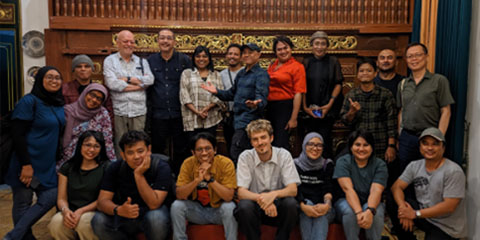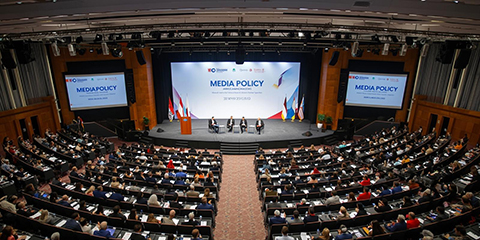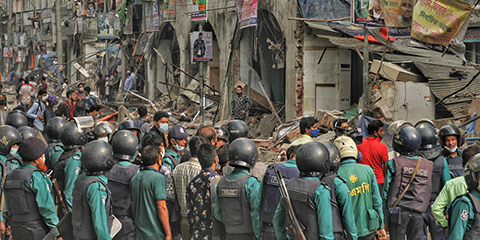Malaysian mission takes key lessons from an innovative, vibrant Indonesian media
JournalismPakistan.com | Published last year | IFJ Media Release
Join our WhatsApp channel
KUALA LUMPUR—Progressive media legislation and an industry commitment to innovation and sustainability were the two key lessons Malaysian media representatives cited from a media mission to Indonesia this week. The International Federation of Journalists (IFJ) organized the Malaysia-Indonesia Solidarity Mission for journalists, lawyers, and civil society activists to build ties between media workers from the two countries and to strengthen advocacy efforts at a critical time for Malaysia’s media reform agenda.
The IFJ Malaysia-Indonesia Media Mission took place in Jakarta, Yogyakarta, and Semarang from December 7-13. Credit: Sairien Nafis / IFJ
During the five-day mission, delegates from across Malaysia’s media as well as IFJ representatives traveled to Indonesia to meet with a range of stakeholders, including journalists, editors, academics, Indonesia’s Press Council (Dewan Pers), activists, and local non-profit organizations in Jakarta, Yogyakarta, and Semarang. The mission comprised representatives from the National Union of Journalists Peninsular Malaysia (NUJM), Centre for Independent Journalism (CIJ), Malaysian Press Institute, and Gerakan Media Merdeka (Geramm) – organizations that have all played a pivotal role in negotiating with Malaysia’s government to push a media reform agenda.
Organised by respected journalist association and IFJ affiliate, Aliansi Jurnalis Independen (AJI) Indonesia, the program was intended as a knowledge exchange, cross-national engagement, and opportunity for network building. Across the week, delegates observed the Indonesian media industry’s innovation, proactiveness, and efforts to support media sustainability and viability amid digital transformation and the rise of precarious work that is widely impacting the media industry.
“This is an important first step for the future generations of Malaysian journalists to be exposed to a starkly different Indonesian landscape,” said IFJ. “We hope it is the first of many more.”
Delegation members reminded the IFJ of the critical need for legislative change in Malaysia, as in Indonesia, to secure stronger protections for press freedom and freedom of expression and establish the long-awaited Malaysian Media Council. But the challenges for Malaysia’s media persist even as the mission unfolded.
“At the same time the mission was taking place, Malaysia’s parliament passed new laws and amendments that jeopardize online expression and open debate. This stands in contrast to the experience of our Malaysian delegation in Indonesia, hearing from industry stakeholders from the chair of the Indonesia Press Council to media academics, all of whom are keenly defending their current freedoms, advocating for media freedom, the right of the public to know, better ethical journalistic training, and greater diversity of reporting and coverage,” said Malaysian-Australian journalist, Kean Wong, who led the mission on behalf of the IFJ.
“Learning from Indonesia’s media it is necessary for Malaysia to undergo industry-wide institutional reform, including capacity building, training, and media development, as opposed to a reliance on individual governing personalities and the whims of the government of the day. Whilst legislative change inevitably carries many challenges and potential dangers for media, it is the best way forward for enduring media independence and sustainability,” said IFJ Asia-Pacific’s legal advisor and Southeast Asia regional expert, Jim Nolan.
IFJ and its Malaysian affiliate, the National Union of Journalists Malaysia (NUJM) together underlined how Malaysia’s media sector can draw inspiration from Indonesia’s dynamic and transforming media landscape to open up similar opportunities in Malaysia.
IFJ extends its thanks to AJI for hosting the cross-cutting five-day program, supported by the IFJ European Commission-funded project ‘Strengthening Malaysia’s Media for Change’.
Key mission findings:
How Indonesian media actively prioritize younger workers in staff and target demographics in outlets such as IDN Times, Narasi, and Konde.co and demonstrate the potential of a dynamic, youth-driven workforce for media sustainability and innovation.
- The diversification of Indonesian media businesses for commercial sustainability while maintaining journalistic independence outside of political funding, by developing multiple income streams beyond advertising.
- The challenges for local and regional media to maintain newsroom independence and viability when they remain reliant on government advertising budgets.
- The rise in the popularity and viability of regular fact-checking content to target misinformation and disinformation.
- How media houses and the Indonesian Press Council are engaging directly with digital platforms including Meta and Google on fact-checking initiatives.
- The university journalism curriculum changes to include data and digital journalism, generative artificial intelligence, social media, and multimedia storytelling.
- How journalist collectives and unions are leading the way in actively organizing freelance and precarious workers and working with the government to legislate for their fair entitlements.
- Young workers, freelancers, and students are now an organizing priority for unions to not only build the movement but to support and train on ethics and other professional issues.In both Malaysia and Indonesia, a critical need was cited for capacity building and training for journalists covering issues of marginalized communities, including women, LGBTQIA+, ethnic and religious minorities.
- A marked rise in “alternative” Indonesian media is gaining a greater audience share, including Project Multatuli, Konde.co, and progreSIP, by actively focusing on issues for minority groups, women, and on labour rights more broadly.
- Hyperlocal content is key to engaging audiences outside urban areas, with a need to train and support the capacity of regional and rural media workers.
- Malaysia’s press card system (which is issued by the government) was noted as an ongoing concern, with the potential to arbitrarily exclude digital outlets, freelancers and citizen journalists.
- In some Indonesian newsrooms, illustrators have been replaced by generative AI, with producers now tasked with creating the images and receiving no additional remuneration.
This week, the IFJ launched ‘Voices Under Watch: The State of Malaysia’s Media 2024’, highlighting the urgent need for meaningful and ongoing government commitment to the principles of media independence in Malaysia if the country’s media is to survive and grow into the future.
The IFJ said: “Indonesian media outlets, new and established, are taking the challenges that confronting their industry with creativity in their approach, while cautiously preparing for potential shifts under the new government, particularly to legislation affecting media. At the same time, Malaysia’s media sector, while vibrant, remains constrained by a lack of impactful reform and an over-reliance on political funding and individual governing personalities. The mission’s findings underline the urgency for Malaysia’s leaders to take decisive steps towards working with the industry and stakeholders to collaboratively foster a more robust and independent media ecosystem to sustain in the evolving digital space

























